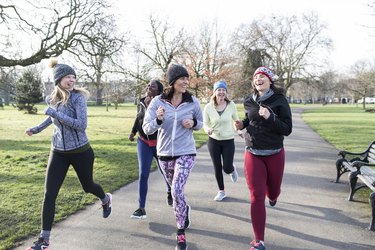
With all the attention paid to the effect that aerobic exercise has on heart rate, you might think the only requirement for an effective workout is to increase your heart rate. If that were true, watching a scary movie would do the trick.
Effective exercise occurs when the lungs, heart and muscles work harder together. So why all the focus on heart rate? It's easy to measure and, more importantly, it changes directly with the metabolic requirements of the muscles.
Video of the Day
Video of the Day
Tip
Heart rate typically increases when you begin to work out. However, as your physical condition improves, heart rate at rest often decreases as this muscle become more efficient.
In the Beginning
The instant you begin your workout, your muscles consume more energy and produce more waste products. In order to continue making more energy, the muscles require additional oxygen pumped from your heart.
The amount of oxygen needed and the amount supplied are tightly controlled by your brain, which senses the concentration of waste products in the blood. The harder the muscles work, the more waste products are produced, and the more your brain increases your heart rate.
Read more: Cardio Exercise Heart Rate
Steady State Rate
Once the brain has increased your heart rate to the point where oxygen supply meets the demand of the muscles, your heart rate will plateau for the remainder of your workout.
But what if you turn into a stiff head wind? Your muscles work even harder, producing more waste products sensed by your brain which, in turn, causes a further increase in heart rate to meet the elevated oxygen requirements of your muscles.
Impact of Dehydration
Dehydration also increases heart rate during exercise. Sweating draws water from the blood and, over time, leaves less blood flowing through your heart and to your muscles, reducing oxygen supply to the muscles.
Your brain counters with an increase in heart rate, but if dehydration continues, heart rate will continually increase since oxygen supply never meets demand. Drinking an amount of fluid equal to what is lost through sweating prevents dehydration, leaving heart rate at its normal level.
Read more: What Is a Good Exercise Heart Rate?
Recovery After Exercise
Once you stop exercising, your muscles demand less oxygen but the brain continues to supply extra oxygen to help with the recovery process. Some aspects of recovery, like lactic acid removal, happen within minutes, but others, such as repair of muscle proteins, can take hours to complete. This means your heart rate will remain high for minutes or even hours after exercise, supplying extra oxygen to help with recovery.
Effects of Training
As you perform regular aerobic exercise over months and years, the chambers of your heart can expand better, allowing them to fill with more blood. The walls of your heart become slightly thicker, making your heart a more powerful pump. Your heart also becomes more efficient at pumping blood.
Therefore, each time your heart contracts, more blood is pumped to your muscles. At any given exercise intensity level, your bigger, stronger heart can supply the required oxygen at a slower heart rate.